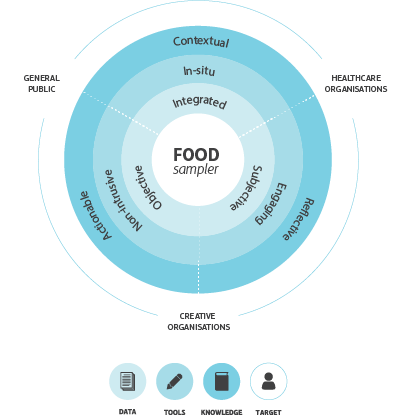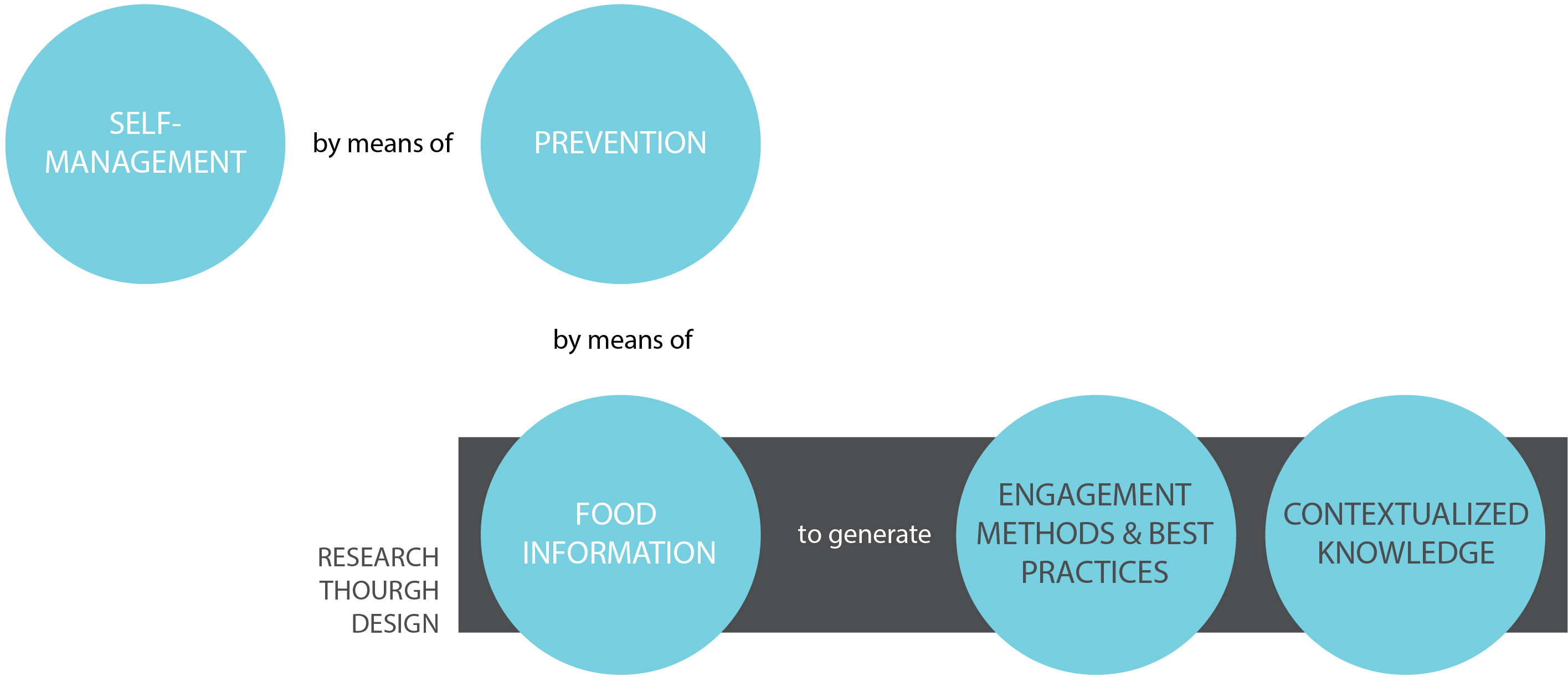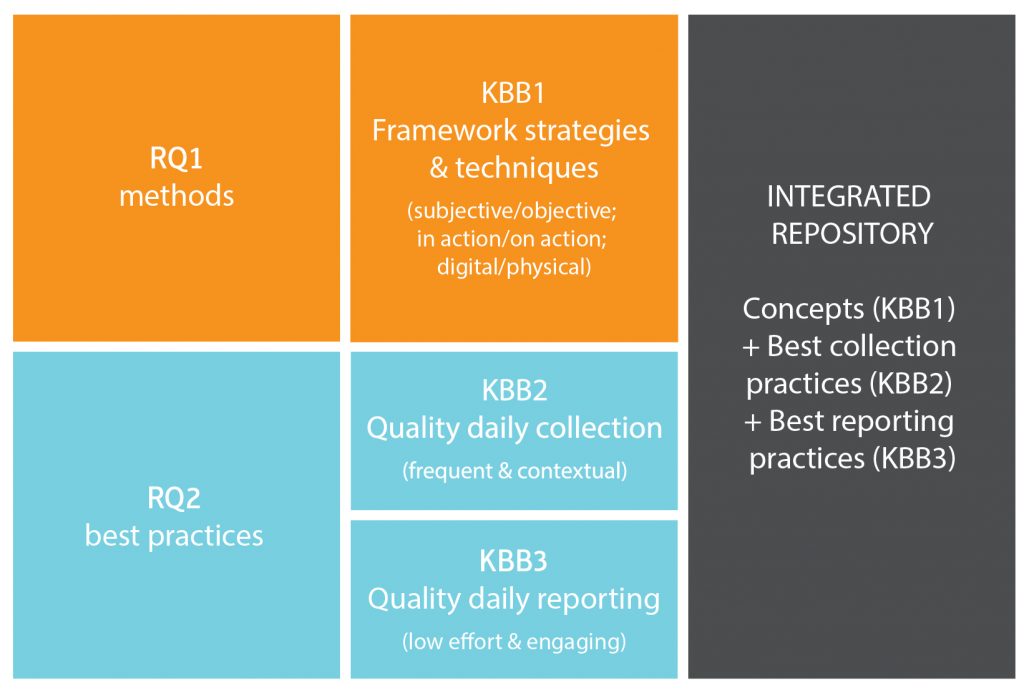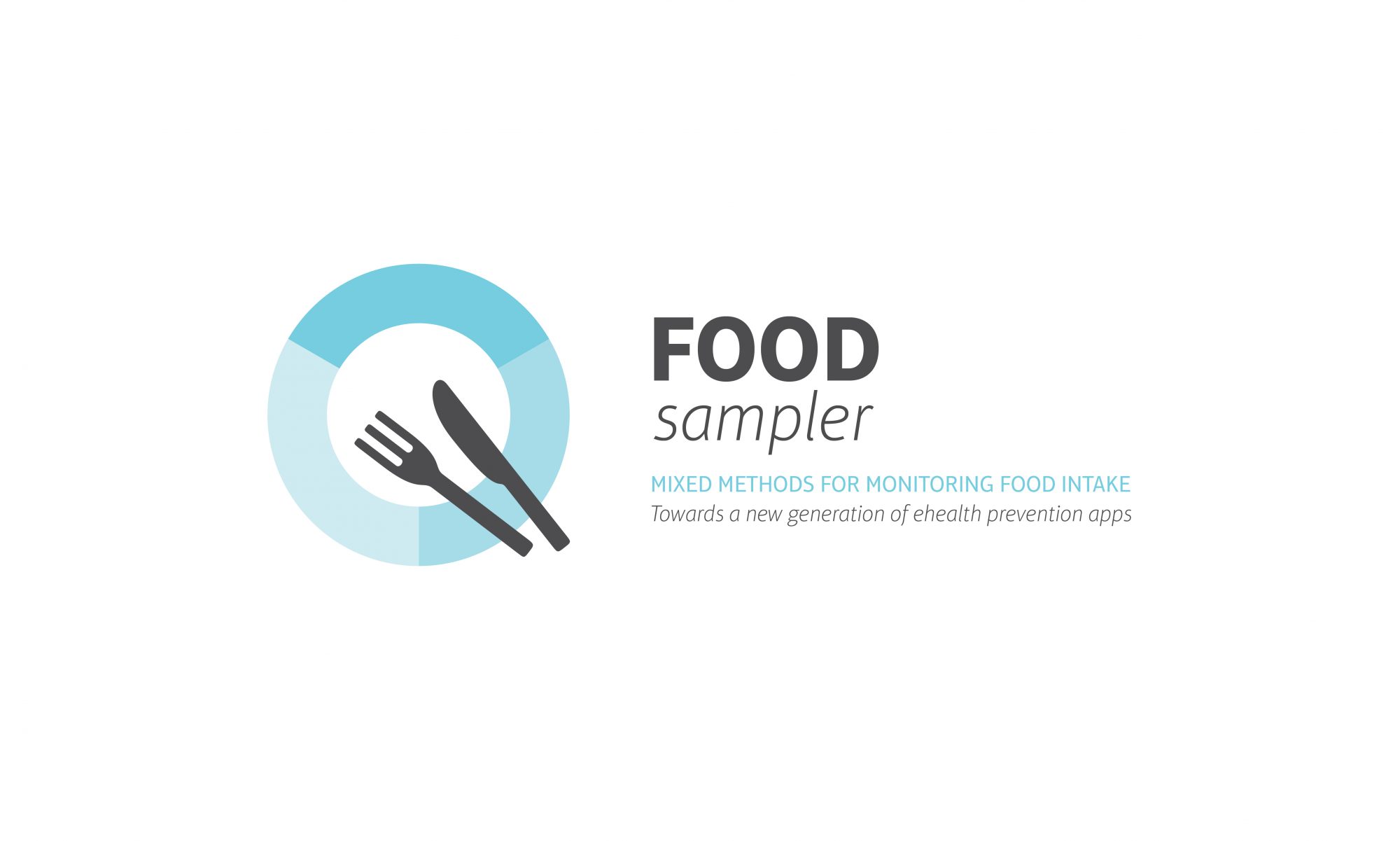Consortium
Creative Industry and Health organisations
- TUD – Creative industry research organization (self-management, user engagement, selfreporting/monitoring, motivation/persuasive theories, health informatics)
- HAN – Health research organization (older adults and food measurements for overweight interventions)
- ConnectedCare – Creative industry (eHealth apps conceptualisation/development)
End user organisations
- Dutch Overweight Foundation/Dutch Obesity Association
- Centre for Overweight Adolescent and Children’s Healthcare (COACH)
Expert organisations
- Dutch Dietetic Association (NVD)
- Knowledge Centre of Dietitians for Overweight and Obesity (KDOO)

Funding
- ZonMW – CreateHealth program, project number # 40-44300-98-133
- Theme: prevention of overweight and obesity in older adults
- Type of call: research through design
Goal
Overweight and obesity affect the entire population. On a day-to-day basis, this problem relates to what people eat and how much they are physically active. Towards changing food consumption habits and physical activity levels, one first needs to understand the ecology of food intake practices and identify relations between food intake and other related activities. Existing questionnaires, which are academically sound and validated, are long and time consuming, and their applicability in real life is limited. To increase frequency and accuracy of data, existing reporting techniques need to engage participation and extend data collection with contextual and dynamic aspects of food practices. Based on Mixed Method Research, Persuasive and User engagement theories, and in-situ reporting methods, this project aims to gain an understanding of the best practices of food reporting in daily life and of the contextual factors that influence food intake practices.
- RQ1: What contextual knowledge is needed for people and experts in order to generate understanding of food behaviour?
- RQ2: How to engage people in reporting/monitoring strategies in order to generate the necessary contextual knowledge of food behaviour?

Relevance
Recent developments on eHealth enable a shift in the responsibility of one’s health condition. In prevention of overweight, health informatics becomes an interesting alternative to support people in self-managing their food behaviour in the complexity of their daily activities. Designers of e-health apps requires knowledge on what information is relevant for self-management of food behaviour and what strategies are needed to enable active involvement on one’s health condition. However, due to the limitation of the existing food intake measurements, nutritional researchers and dietitians currently rely on poor knowledge to describe and explain people’s food behaviour. Therefore, the need to increase the quality of the existing knowledgebase on food behaviour and to develop requirements for health informatics systems to support people’s active engagement (by means of reporting and reflection) on food management.

Research context
The project will develop around the field of data management in health informatics that comprises several stages of people interacting with data: from preparation (what do I want to collect) to collection (how do I collect) to interpretation (how to organize the data) to reflection (what can I learn) and action (what can I do/change). Most of existing commercial initiatives are technologically oriented and aim to automatize most of these stages. The advantage is that it minimises the effort people need to invest. But it results in a passive involvement that has negative consequences on people’s appropriation of knowledge. This proposal aims to explore and assess strategies to support people as active providers and users of information about their health condition.
Based on the end-user organisations, two case studies have been defined:
- Relapse: considering the five stages of readiness to change, prevention will be studied in the context of the last stage of maintenance to avoid relapse. Involving the needs of older adults in that later stages of the dietary program will contribute to the design of food informatics that support the maintenance level. This case study will be facilitated by the organizations Dutch Overweight Foundation/Dutch Obesity Association, Dutch Dietetic Association (NVD) and the Knowledge Centre of Dietitians for Overweight and Obesity (KDOO).
- Social network: considering children as patients with overweight, the aim is to investigate the role of food informatics in a family program that actively involves parents and other relatives in the treatment of the child. Understanding the needs of the involved parents (and relatives) throughout the child treatment will contribute to the design of food informatics that prevent parents to become overweight in older ages. This case study will be facilitated by the Centre for Overweight Adolescent and Children’s Healthcare (COACH)
Approach
The project follows a research through design process. Design interventions will be developed around the following three research topics:
- Reporting in action (based on Experience Sampling Method) is defined as the reporting activities close to the event of interest. Utterly quantitative, this reporting activity collects objective as well as subjective data. It is expected that adaptive sampling protocols, multimodal input techniques and integration of sensing techniques will contribute to low-effort reporting in action.
- Reporting on action (based on Daily Reconstruction Method) is defined as the reporting activities done on accumulative events. Both quantitative and qualitative, this reporting activity aims to collect deeper subjective data on the events of relevance. It is expected that persuasive techniques (e.g. nudging, confrontation, etc.) will contribute to engaging in reporting on action.
- In-situ mixed food informatics (based on health informatics and Mixed Method Research) is based on the integration of reporting in action and reporting on action to minimize reporting costs while maximizing richness of data. Mixed-design strategies can combine the output of one technique, as input to the other one, and obtain different knowledge outcomes, such as exploration, explanation, triangulation.

Expected outcomes
Three knowledgebase blocks will be generated and represented in an integrated repository accessible to nutritional researchers and experts, creative industry, overweight patients and general public:
- Knowledgebase block 1: contains conceptual knowledge on the typology of data and methods to capture contextualised data on food behaviour. It develops a framework that defines the integration of subjective and objective data, reporting and reflective mechanisms (in action / on action) and digital and physical concepts to capture food contextualized knowledge. It also contains a repository of the knowledge captured throughout the design interventions.
- Knowledgebase block 2: contains descriptive and explanatory (best practices) knowledge on developed and tested data collection strategies to increase the frequency and contextual value of the data collected.
- Knowledgebase block 3: contains descriptive and explanatory (best practices) knowledge on developed and tested data reporting strategies to support low-effort and engaging participation of people as active providers and users of data.

General work plan
Three work packages are defined:
- WP1: Design research: understanding needs, challenges, and opportunities of in-situ mixed food informatics.
Main tasks: T1.3-develop in-situ mixed framework, T1.4-conduct user research/co-design Sessions
- WP2: Design interventions: identifying best practices of in-situ mixed informatics that fit people’s daily life
Two iterative tasks: in action (T2.2) and on action (T2.3) conceptualisation* and implementation** and user evaluation of motivation/engagement strategies for techniques to support self-reporting. Data collection and analysis of food reporting/monitoring
Final task: conceptualisation, implementation and assessment (2 months evaluation) of motivation/engagement strategies for an integrated concept (T2.4) with in action and on action mechanisms. Data collection and analysis of food reporting/monitoring
* conceptualisation is supported by 2 TUD graduation projects
** technical development and implementation is done by ConnectedCare
- WP3: Knowledge dissemination: making impact through knowledge
Main tasks: scientific publication (T3.1), development of conceptual demonstrator * (T3.2),
visualisation and communication of outcomes in an integrated repository (T3.3)**
* demonstrator is done by ConnectedCare
** integrated repository – content is generated by TUD/HAN, interactivity is implemented by ConnectedCare
